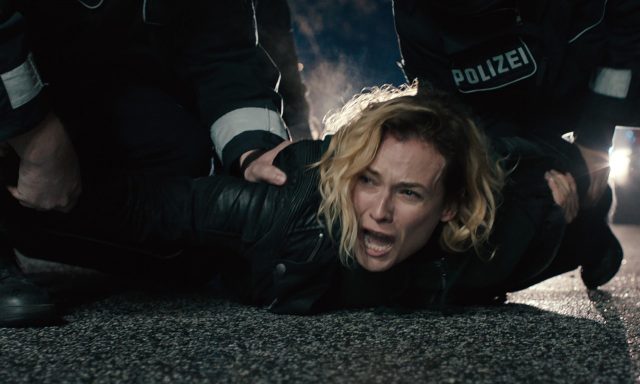 AKA Real Life Horror Original title: Aus dem Nichts (out of nowhere)
AKA Real Life Horror Original title: Aus dem Nichts (out of nowhere)
There is a Stoic practise connected to the Latin phrase memento mori (remember death). It’s not a practise for the faint-hearted. The practitioner is asked to remind him- or herself, actively, every day, that one’s death or the death of those closest to you, could come at any moment, out of nowhere, usually not out of the direction you are expecting it. The purpose of the practise is to keep in touch with reality and to put (mundane, everyday) things in perspective.
Death out of nowhere is exactly what happens to Katja (excellent Diane Kruger), the main character in Fatih Akin’s new movie In the Fade. One moment she has a husband and a son, the next moment they are dead, killed by a terror attack, the only fatalities. A home-made bomb exploded in the Turkish neighbourhood of a big German town where Katja’s Turkish husband had his business.
Katja is in shock and suffers immensely. Her pain is sometimes almost unbearable to watch. The worst scene, real life horror, is seeing her coiled up in her son’s bed, screaming, mad with grief. She struggles to make sense out of what has happened, as does the police. One of the very first questions they ask Katja, after the victims have been identified as her son and husband, is whether her husband was religious. She is confused and doesn’t understand the question. The police, like the audience, expects the terror to be connected to Muslim extremism. But it isn’t. The next lead the police pursues is drug related. Katja’s husband Nuri spent four years in prison for dealing drugs. Surely he must have continued dealing, they are well aware of, the wife was just ignorant of it. That seems to be their reasoning, and Katja’s mother agrees with the police. But death didn’t come out of that direction either. Nor is there a connection to the mafia or other criminal organizations.

The police get to the terrorists only after a worried citizen reports in something suspicious. The attackers are in fact neo Nazis, and their only motive was apparently the migrational background of the people living in the targeted part of town. This is one of the many allusions to real events that happened in modern time Germany.
From 2000 to 2007 the far-right terror cell NSU (Nationalsozialistischer Untergrund) is supposed to have committed 10 murders and two bomb attacks. The murder victims, except for a young police officer, all had a migrational background, and that background appears to have been the terror cells only motive. The murders happened all over Germany, and although a great number of police were investigating them over a time of ten years they never even got close to the attackers. The police searched for the murderers in the drug milieu and in connections to foreign criminal organizations active in Germany, thus traumatizing the victims’ families additionally by having them think their fathers, husbands, sons and brothers had been criminals and had led double lives. Then, in 2011, the police were finally onto the attackers, and two of them supposedly committed suicide to escape being captured. The surviving group member, a woman, Beate Zschäpe, turned herself in after setting their hideout on fire and spending four days on the run. The trial started in 2013 and the verdict is expected around Easter 2018.

In the movie the verdict for the attackers is ‘not guilty’, because the evidence is not airtight and the court has to rule in dubio pro reo. Katja, having put all her hopes in seeing the attackers rot in prison is pushed over the thin edge she was walking on. She is torn between thoughts of suicide and self-administered justice. To find out which path she will choose, you will have to watch the movie yourself, and then make sense of the ending.
The movie is excellent and absolutely worth watching. It is made additionally interesting by the fact that Josh Homme (Queens of the Stone Age, Kyuss) wrote the soundtrack. He agreed to take the job after having been shown an early version of the movie. Although the music is not what one might expect. For starters, there isn’t a lot of background sound in general. The most difficult scenes are usually without background music which makes them even more raw. When there is music, most of the time it is very minimalistic and experimental: one or two instruments. The lower keys of the keyboard, like a heartbeat, with a violin, like knifes cutting.
All actors look completely unglamorous, especially the police inspector, like everyday people, thus pushing the point further home: it can happen to anyone. Memento mori.
(Review Slavica Bosnjakovic Sikora)

21/07/2018 at 4:05 pm
Saw this in the local theater a few months ago, they even held a whole presentation about the crimes of the NSU and generall nazism after the movie.
Can’t say it was memorable, the characters weren’t very likeable in my opinion, the plot worked fine kept me hooked.
Just another watchable european movie, nothing special.